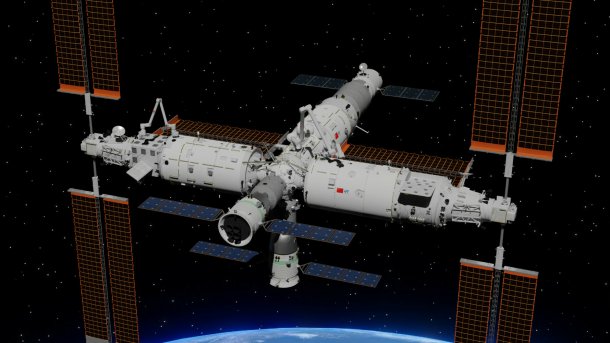Hit by space debris: Chinese space station successfully repaired
Last year, China's space station was damaged by space debris. The damage was successfully repaired, it is now said, before the crew change.

Rendering from Tiangong
(Bild: Shujianyang, CC BY-SA 4.0 Deed )
- Martin Holland
- Ars Technica
Following a partial power failure on the Chinese space station as a result of damage caused by space debris, the crew has repaired the damage, and the aim is to prevent a recurrence in the future through better preparation. The Xinhua news agency reports that those responsible have now made this public, shortly before the launch of the next crew. According to the report, the central solar modules were repaired during two spacewalks, which took place at the end of December and on March 1. The report also states that China's space agency has succeeded in significantly reducing the error rate for collision warnings, and special cameras are to help inspect damage in the future.
Several countermeasures implemented
The impact and the subsequent partial power failure occurred last year. The report also mentions space debris, but the damage could also have been caused by micrometeorites. The two space missions to repair the solar modules were therefore the first ever repair missions in space by Chinese space travelers. The next crew, which is due to launch to the space station this Thursday, will also have the task of installing special protective devices for particularly important elements on the space station. In addition, there is a system that uses the atmospheric pressure inside the space station to search for indications of possible leaks.
China's space agency is now saying that the problem of space debris is growing due to increasing space activities. If collisions are feared, the orbit of the space station would be proactively adjusted. The remaining space-faring nations are also facing increasing problems due to the growing number of satellites that can no longer be controlled, the remains of rockets and other space debris. However, while large objects are observed from Earth and collision warnings provide time for evasive maneuvers, tiny fragments can also cause immense damage due to their high speeds. Such particles are produced by collisions in orbit or by the targeted destruction of satellites. Such tests are therefore subject to criticism.
China plans to send the three taikonauts Ye Guangfu, Li Cong and Li Guangsu to the "Tiangong" station today, Thursday. They are due to launch at 8.59 pm local time (2.59 pm CEST) on board the spaceship "Shenzhou 18" from the Jiuquan spaceport in the northwest of the People's Republic. The three are to replace the current crew, who will then return to Earth. During their six-month stay, the new crew will carry out various scientific experiments in orbit as well as several spacewalks, it was reported. Apart from the International Space Station (ISS), China's is the only inhabited human outpost in space. China is not part of the ISS project and is therefore pursuing its own extremely ambitious space program.
(mho)